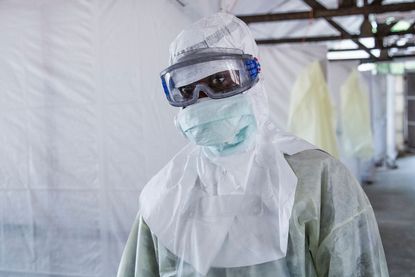What is Lassa fever and are we in a ‘new pandemic era’?
British patient dies of virus that causes bleeding eyes and facial swelling

A patient has died after a third case of Lassa fever was confirmed in the UK, the Health Security Agency (UKHSA) has said.
Three cases have so far been confirmed, marking the first time the potentially deadly infectious disease has been reported in the UK for more than a decade. One of the two confirmed cases has recovered, and a second is receiving care at the Royal Free London NHS Foundation Trust.
The patient who died was being treated at Bedfordshire Hospitals NHS Foundation Trust. The UKHSA said it was “contacting the individuals who have had close contact with the cases prior to confirmation of their infection”, adding: “The risk to the general public remains very low.”
Subscribe to The Week
Escape your echo chamber. Get the facts behind the news, plus analysis from multiple perspectives.

Sign up for The Week's Free Newsletters
From our morning news briefing to a weekly Good News Newsletter, get the best of The Week delivered directly to your inbox.
From our morning news briefing to a weekly Good News Newsletter, get the best of The Week delivered directly to your inbox.
All of the cases are “within the same family in the east of England and are linked to recent travel to west Africa”, according to The Guardian.
What is Lassa fever?
Lassa fever is a haemorrhagic fever caused by the Lassa virus and is carried by wild rats, which spread the virus through their urine and droppings, said the Foreign and Office (FCO) website.
The type of rats that carry the disease are most common in tropical West Africa and once infected, will shed the virus throughout their life.
The FCO website said that transmission of Lassa virus to humans “normally occurs through contamination of broken skin or mucous membranes via direct or indirect contact with infected rodent excreta, on floors, home surfaces, in food or water”. It can also pass from person to person through bodily fluids.
Sign up for Today's Best Articles in your inbox
A free daily email with the biggest news stories of the day – and the best features from TheWeek.com
What are the symptoms?
Most people who contract Lassa fever will have only mild symptoms such as fever, headache and general weakness, and some may not experience any symptoms at all.
There is no vaccine for the condition and it is extremely hard to diagnose, because about 80% of infected people show no or only mild symptoms. In addition, the symptoms are extremely similar to those of a number of other diseases.
In severe cases, Lassa fever closely resembles Ebola, the BBC said, causing “bleeding through the nose, mouth and other parts of the body”, as well as significant damage to internal organs.
Lassa fever has a fatality rate of about 1% overall, but women who contract the disease late in pregnancy face an 80% chance of losing their child, or dying themselves.
‘New pandemic era’
Lassa fever is “endemic in countries including Nigeria, Sierra Leone and Ghana”, where it kills “roughly 15% of those who are hospitalised”, The Telegraph said. But its arrival in the UK “is highly unlikely to trigger a major outbreak”.
Scientists, however, told the paper that “it is possible a track and trace initiative will be launched” in order to stem further infections, while additional cases may be announced and there may be “complications in the patients’ treatment”.
“Fortunately, the virus is nowhere near as infectious as many other pathogens,” said Dr Michael Head, a senior research fellow in global health at the University of Southampton. “While any Lassa cases within the UK are of concern, we won’t be seeing transmission on anything like the scale we have with the Covid-19 pandemic.”
However, its arrival in the UK is a reminder that the world could be entering a “new pandemic era”, as Professor Anthony Fauci, the US’s top infectious diseases expert, warned in August 2020.
“The next pandemic may not look like Covid-19,” said The Telegraph. But as well as Lassa fever, the World Health Organization’s “list of priority pathogens with pandemic potential includes Crimean-Congo haemorrhagic fever, Ebola and Marburg”.
Create an account with the same email registered to your subscription to unlock access.
-
 Who actually needs life insurance?
Who actually needs life insurance?The Explainer If you have kids or are worried about passing on debt, the added security may be worth it
By Becca Stanek, The Week US Published
-
 Sexual wellness trends to know, from products and therapies to retreats and hotels
Sexual wellness trends to know, from products and therapies to retreats and hotelsThe Week Recommends Talking about pleasure and sexual health is becoming less taboo
By Theara Coleman, The Week US Published
-
 Is the AI bubble deflating?
Is the AI bubble deflating?Today's Big Question Growing skepticism and high costs prompt reconsideration
By Joel Mathis, The Week US Published
-
 The tricky science behind eliminating peanut allergies
The tricky science behind eliminating peanut allergiesfeature Scientists are racing to find a cure for allergies while profit-conscious companies wait eagerly in the wings
By Fred Kelly Published
-
 Who owns Qatar and what does the Gulf state own?
Who owns Qatar and what does the Gulf state own?feature The World Cup host’s Sovereign wealth fund has £40bn of investments in UK alone
By Chas Newkey-Burden Published
-
 The science behind lab-grown blood
The science behind lab-grown bloodfeature Development of ‘absolute game changer’ could help those with sickle cell and other conditions
By Chas Newkey-Burden Published
-
 ‘We’re being whipped into a frenzy about monkeypox’
‘We’re being whipped into a frenzy about monkeypox’Instant Opinion Your digest of analysis from the British and international press
By The best columns Published
-
 ‘Chris Whitty should not be subject to ignorant public attacks by politicians’
‘Chris Whitty should not be subject to ignorant public attacks by politicians’Instant Opinion Your digest of analysis from the British and international press
By The best columns Published
-
 What we know so far about North Korea’s latest long-range cruise missile
What we know so far about North Korea’s latest long-range cruise missilefeature US says the weapon may have nuclear capabilities and poses ‘threats’ to neighbouring nations
By The Week Staff Published
-
 What causes Havana Syndrome?
What causes Havana Syndrome?feature Officials investigate outbreak of cases at US embassy in Colombia
By The Week Staff Last updated
-
 ‘A change in grading could be a timely and useful way for the government to ‘reset’ A-levels’
‘A change in grading could be a timely and useful way for the government to ‘reset’ A-levels’Instant Opinion Your digest of analysis and commentary from the British and international press
By The best columns Published